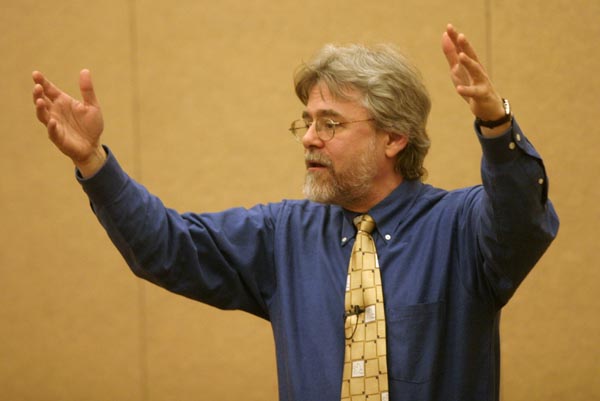Losing Moses part II
Jackson Browne once sang, in one of his most passionate and sad and moving songs, The Pretender, a story about a guy selling out.
I’m going to rent myself a house
In the shade of the freeway
I’m going to pack my lunch in the morning
And go to work each day
And when the evening rolls around
I’ll go on home and lay my body down
And when the morning light comes streaming in
I’ll get up and do it again
Amen
Say it again
Amen
He ends the song after wishing for something better, and wondering “what became of the changes, we waited for love to bring? Were they only the fitful dreams of some greater awakening?” with this:
I’m going to be a happy idiot
And struggle for the legal tender
Where the ads take aim and lay their claim
To the heart and the soul of the spender
And believe in whatever may lie
In those things that money can buy
Thought true love could have been a contender
Are you there?
Say a prayer for the pretender
Who started out so young and strong
Only to surrender
Well, it is a moving piece about selling out, losing one’s values, accommodating oneself to the dominant culture, turning inward, losing faith and giving up any chance of forging a meaningful alternative to the shallowness of the American Dream.
Which is a rather long way into my promise to blog a bit more about the Hedges book which illustrates how our culture has lost any connection it may have had with the ways of God. Moses has gotten lost, or been taken over, by “the freeway.” The dominant imagination of consumer capitalism (words he doesn’t use, by the way) has co-opted the prophetic witness of Holy Scripture. As Walter Brueggeman makes powerfully clear in the opening pages of The Prophetic Imagination, this is true for social conservatives and social liberals. The zeitgeist of our times has influenced our worldviews and we are hard pressed to develop a truly prophetic, passionate and pathos-filled vision as did the Hebrew prophets, from Moses to Jesus. Which may or may not be what Hedges inteded with his odd title and odd book jacket.
This is, though, clearly not a work about political pluralism, church-state relationships or the legality of placing the Ten Commandments on plaques, in courtrooms or public schools. Rather, it is an evocative meandering through the ways in which these deep values are contested, subverted, triavialized or ignored in our day and age, often, he seems to say, by those who give them the loudest lip-service. If you know anything about us here at Hearts & Minds, you will know it is a concern with which we resonate. From the messages of Ken Myers at Mars Hill Audio, to Wendell Berry’s slow-moving novels, to the radical Walsh & Keesmat commentary on Colossians (Colossians Remixed) that I wrote about over at the website months ago, to our constant reference to books about worldview, we are part of a movement, it seems, of those questioning how the mores and ethos of our culture has eroded Biblical truth and domesticated Scriptural ways of being in the world. We must read the Bible, more, yes! But we must learn to read it in a community of discourse that is attempting to allow God's Word to shape us in our interaction with the secularized modern culture (rather than reading it merely within the sets of assumptions of that culture.) I think this book is a helpful resource in our formation of being those kind of readers.
***
The first chapter of Losing Moses on the Freeway, then, entitled "Mystery", is rather an extended preface, one of the most chilling and riveting stories I have ever read. Not since my own introduction to the literature of urban ministry and ghetto life— I think of William Stringfellow’s first book, or Jonathan Kozol’s Death at an Early Age or some of the mid-twentieth century Afro-American writers---have I read such an indicting example of how the church has failed those living in the inner city. (As we all ponder—or at least I pray to God in heaven that we are all pondering---why the Bush administration cut funding for anti-hurricane repairs in overly-developed, unusually poverty-stricken, New Orleans and why most of those stranded in the awful floodwaters are poor, this opening chapter which tells of Hedges’ Divinity School internship in the rough and tumble urban blight of Boston’s Roxbury, would make very timely reading.) Hedges’ pell mell efforts to do something useful there—by himself in a run-down manse, apparently paid (a very little) by an uninvolvement denomination, not helped or offered support, let alone community---is heart-rending and scary. He writes of the abuse he suffered from neighborhood thugs and addicts and the disconnect between that harsh mission and his arcane, theologically liberal academics back at Cambridge.
Hedges’ own awareness of and shame about his struggle with his (racist?) ego and violence, manifesting when regularly accosted, was a turning point for him. His painful decision to leave this ministry, such as it was, and leave, further, the Church of Jesus Christ, is hard to read. I wiped tears more than once, clutched the book to my chest in horror (as he described thrilling boxing matches in which he was pummeled), and shook my head in disbelif at the foolishness of entering into significant urban mission without adequate support or congregational care. That chapter is eye-opening for most middle class readers, anyone who has funded “urban outreach” and yet will sound familiar to any who have lived in harsh inner city environments. It brought back some vivid memories for me, I must say, although our few McKeesport and Pittsburgh years (prior to the bookstore plan) were never that bad. It is an important and mesmerizing story, with much to learn about how to (and more, how not to) do urban ministry. I appreciated Hedges honesty and courage, on the streets and in these pages.
Then, each of the other chapters tells the story of a person who did or didn’t embody the particular commandment under reflection. There are good chapters on idolatry—one with the entry point being a fascinating piece on a “Phish head” who lost herself in the subculture of the enigmatic jam band. What an example!
A very moving, sad and eye-opening chapter on lying reports on comfort women who serve bars in neighborhoods comprised mostly of illegal immigrants in Long Island. These women—not prostitutes, he is clear to explain—tease lonely and culturally displaced men into buying them drinks (as the bar keeps account and profits) and then pretend to be in romantic relationships with them. This sordid dishonesty is a structure---a cultural institution---which exits in utter deceit and where everyone, from bar owners who set up the “game” to the women to the undocumented workers themselves, is complicit. He does more than shake his finger at these poor folk, though, but rather offers a brilliant and caring sociological view of the profound violation of God’s call to authenticity that haunts us all. And what it may really mean to not use the Name in vain.
Another example of a chapter of such nuance and compelling storytelling is the chapter on adultery. There, he tells the sad story of H.R. Vargas, a young man struggling to make sense of his life after being born out of wedlock with a father who left his mother. Abandoned and abused in a dysfunctional foster care system, he eventually longs to do better than his own parents; he has no role models of normative fathering and he struggles. It is a painful and yet rewarding story, well told, and the start of a serious reflection on the meaning of this commandment. Not moralistic, nor dismissive, it shows the consequences of a violation of God's principles for sexuality and family troth.
The chapter on theft was, similarly, sad and powerful, and yet very insightful. He traces the life of a perpetrator of high-end insider trading, a gentleman who went to jail for his minor role in some big white-collar crime. Hedges prophetic critique of crime in the suites comes through powerfully—granted, the boys from Enron and company are fairly easy targets, but his telling of the reform of this guy who let greed get the better of him is very moving. With ample quotes by social commentators like Hannah Arendt, and this moving narrative of loss and redemption, it makes for a very good essay.
One of the most moving chapters for me told of his love for his father, and unfolded the fascinating journey of a fairly common but yet dignified and progressive Methodist preacher. Without really explaining (but aware he is in the chapter about “honoring” ones’ parents) he shifts to the edge-of-your-seat telling of a very controversial and electric anti-war speech he gave as a commencement speaker at a small college. As one who has given controversial speeches, and protested in rather public places, it brought back sweaty underarms and heart-racing as I wondered if he would be booed of the stage, heckled or actually attacked for his bold words. He has the entire transcript of his eloquent sermon against making warfare into a national ideology and the dangers of this particular war, with the crowds increasing interruptions (even the power turned off on the public address system) actually recorded as well.
He then ends—as my heart beat nearly out of my chest---with this:
I sat down in the chair behind the podium. I opened a small plastic bottle of water. The awarding of the diplomas began. A heavy set man who identified himself as the head of campus security asked me to climb off the stage and follow him. I was put in a car and driven to my hotel. I packed my bags, was handed the coat I had left in the president'’ office and put on a bus to Chicago.
The event spawned a feeding frenzy among conservative commentators from Rush Limbaugh to his well-groomed counterparts on Fox News. The Wall Street Journal ran an editorial denouncing the talk. The local paper, The Rockford Register Star, reported the event with the headline SPEAKER DISRUPTS RC GRADUATION.
I have few interviews. I refused invitations to go on television talk shows. I did not want to toss little bits of red meat into the public arena to keep the story alive.
The New York Times, my employer, sent me a letter of reprimand, saying I had made “public remarks that could undermine public trust in the paper’s impartiality.” I was called into the office. It was an unpleasant moment. We all fear losing our job. We all fear insecurity. We dislike angering those above us. I am no different. But I knew what I was called to do. I had seen the cost.
To be silent would be to betray my father, to turn my back on what he stood for, to deny his life, to dishonor his memory, to dishonor my own memory. The physical resurrection of Jesus from the dead is not the only story of resurrection in the Gospels. A few weeks after the crucifixion in Acts, two disciples, who had fled Jesus on the night of the arrest, were hauled before the authorities for preaching. This time they refused to betray Jesus. This refusal was a physical manifestation of the resurrection, of new life.
Hedges has really got me here, and I tremble even as I type that marvelous paragraph. I wonder if those of us with high regard for the authority of the Bible have created ways of reading and heeding the text that we may be able to tell about the Older Testament prophets but we wouldn’t recognize one if he were to sit down beside us. We think we "know" the Bible, but few of us have dared to live it out with the robust abandon of the Biblical characters. We have so domesticated the powerful texts about Moses being called by the Holy I AM to go into the places of power to protest the mistreatment of God’s poor, that we may need to be confronted with a real life example of somebody standing up and speaking truth to power to perhaps even begin to imagine the political and spiritual power of Moses, of Amos, and yes, of those two disciples who committed civil disobedience in the early part of the book of Acts.
And, you should know, this hint that he has learned to speak out for the disadvantaged and stand up for truth in unpopular ways from his beloved father, really gripped me. Even if I have not been mourning the loss of my father-in-law, and therefore pondering the death of my own dad, whose heroic and decent public stances I have written about in our local paper, I still would have been struck deeply by this moving chapter.
I am sad and troubled by Hedges next agnostic lines, but they are nonetheless so honorable, and so real for me, that I want to share them with you. He continues:
I am not sure my father, as a distinct individual, exists in death, although I dream of him frequently. I am not sure he knows what has happened to his son. I doubt he can hear my voice, but then he does not need to. It is his own. I am my father’s son. This is my inheritance. I will not squander it.
Excerpted from: Losing Moses on the Freeway: The 10 Commandments in America Chris Hedges (The Free Press) $24.00 Order here.





<< Home